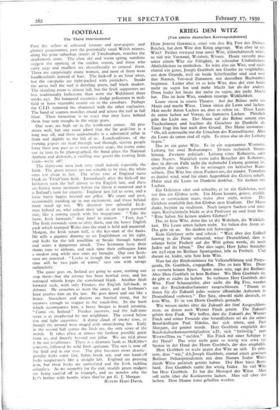FOOTBALL
The Third International
PAST the sellers of coloured favours and newspapers and phoney programmes, past the perennially vocal Welsh miners, along the prim suburban streets of Twickenham, marches the mackintosh army. The clear sky and warm spring sunshine suggest the opening of the cricket season, and those who carry rugs and mufflers try shamefacedly to conceal them. There are surprisingly many women, and most of them wear handkerchiefs instead of hats. The kick-off is an hour away, but the car-parks are tight-packed with picnickers. Inside the arena half the turf is dazzling green, half black shadow. The standing room is almost full, but the Irish supporters are less traditionally frolicsome than were the Welshmen three weeks ago. No bonneted eccentrics dodge policemen in mid- field or hoist vegetable matter on to the crossbars. Perhaps the C.I.D. removed the shamrock with the other explosives. The band of seamen marches round and across the turf in full blast. Their formation is so exact that they leave behind them four neat troughs in the soggy grass.
Our seats are high up in the north-east corner. All pro- mises well, but one must admit that the far goal-line is a long way off, and there undoubtedly is a substantial pillar in front and slightly to the left of us. Lunch-editions of the evening papers are read through and through, sixteen people force their way past us to even remoter crags, the teams come out in turn to be photographed, the band plays the National Anthem and disbands, a swelling roar greets the trotting Irish team—we're off !
The thirty-one men look very small indeed, especially the Irish. The green jerseys are too suitable to be true, the white ones too clean to last. The white rose of England turns black on Twick'nam field. Immediately after the kick-off the Irishmen rush the ball almost to the English line, and there are frantic noisy moments before the threat is removed and it is Ireland's turn for anxiety. England just fail to score, and a loose battle begins beyond our pillar. We crane and peer, occasionally standing up in our excitement, and those behind must stand up too. We discover two splendid Irish- men behind us, who exhort their side in an urgent personal way, like a rowing coach with his megaphone. " Take the loose, Irish forwards," they bawl in concert. " Feet, feet." The Irish forwards seem to obey them, and the heavy English pack which tramped Wales into the mud is held and mastered. Morgan, the Irish scrum half, is the key-man of the backs. He sells a gigantic dummy to six Englishmen on his right, and kicks for the left touchline or breaks through himself and starts a dangerous attack. Two Irishmen have their shorts torn to ribbons, and each time their colleagues form a modest ring while new ones are brought. Our two Irish- men are annoyed. " Looks as though the only score at half- time will be two pairs of pants," says one with savage melancholy.
The game goes on, Ireland are going to score, nothing can stop them—but the referee has been bowled over, and his outraged whistle keeps the scoreboard blank. Another Irish forward rush, with only Freakes, the English full-back, in defence. He crouches to meet the onset, and an Irishman's knee crashes him on the jaw. He goes down and out like a boxer. Stretchers and doctors are hurried along, but he recovers enough to stagger to the touch-line. In the hush which accompanies him, a beery brogue is heard intoning,
" Come on, Ireland." Freakes recovers, and the half-time
score is as prophesied by our neighbour. The crowd below rise and light cigarettes. A dense cloud of smoke rises, as though the ground were ringed with smouldering fire. Early in the second half comes the Irish try, the only score of the match. It takes place at almost the farthest possible point from us, and directly beyond our pillar. We are mkt about it by our neighbours. There is a dramatic hush as McKibben converts, followed by wild Irish applause. The sun is now off the field and in our eyes. The play becomes more drastic: penalty kicks come fast, fights break out, and one hand-off looks suspiciously like a straight left. England are pressing now, but their backs are uninspired and the Irish tackling relentless. As we scramble for the exit, muddy green midgets are being carried off in triumph, and we wonder why the Irin bother with bombs when they've got G. J. Morgan.
RUPERT HART-DAVIS.










































 Previous page
Previous page